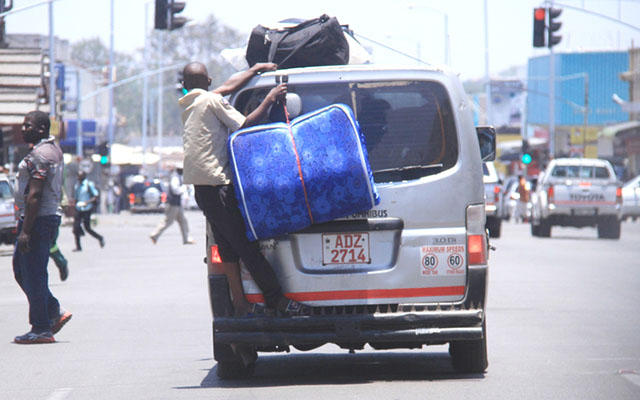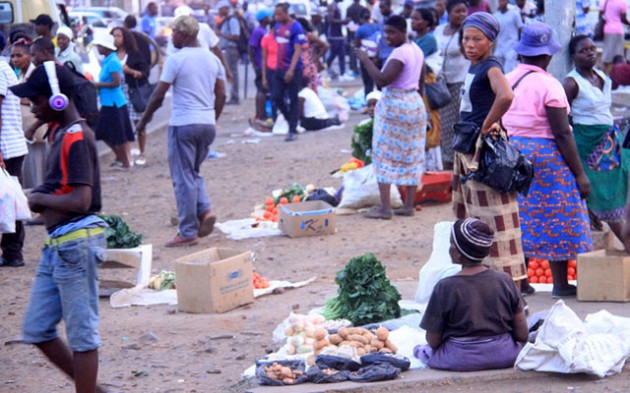Vendors’, mushika-shika menace need sustainable solution

Runyararo Muzavazi Features Reporter
Street vendors across the CBD are still defiant in some pockets of the city despite recent moves by the police to clear from the streets. Even though there has been a significant improvement in decongesting some major streets in the capital, vendors and “mushika-shika” pirate taxis and kombis still fight cat and mouse games.
“Rounding up sellers and telling them to move from the pavement has helped to clear some major roads such as Robert Mugabe Way,” Celine Muvengwa of Highfield. You can walk freely now without the hassle of negotiating around street vendors and the risk of being knocked down by mushika-shika operators. Despite the improvement, there are some who are fiercely resisting being moved from the streets. If nothing is done, very soon, vendors could soon flood the streets again.”
A snap survey by The Herald showed that Kombi drivers are still doing their mushika-shika activities at the corner of RG Mugabe Way and Angwa Street, Leopold Takawira Street, corner Sam Nujoma Way and Herbert Chitepo Street and next to OK supermarket en-route to Mbare. This was coming hardly a month after street vendors were swept off sidewalks and pirate taxis were driven off the Central Business District. It’s merry-go round and the Harare City Council and the police are back where they started.
Mshika-shika pirate taxis are still plying their usual routes whereas vendors have re-appeared on the streets selling different products along pavements and other undesignated areas. On October 10, this year, the police arrested scores of vendors resisting moves by the Government to remove them from the streets. Vendors say selling is their only means of survival.
They say that a total ban and clearance from the streets will destroy the livelihoods of thousands of people who depend vending for survival. Most say they have no choice but to resort to selling their wares due to lack of jobs as a result of the difficult economic circumstances they face. Vendors also say the police should stop the raids and that they also need better treatment as people trying to survive in a “hostile economic” environment.

Vendors are back on the streets by night as they avoid being arrested during daytime by police and council operations.
Many of the vendors have moved from villages and other poor suburbs to the cities, arriving with little education or skills and selling is the only way for them to survive. Fruit and vegetable sellers make up the bigger share of the vendors, but an eclectic mix of items can be bought on the roadsides — from clothes, combs and chairs, to suitcases, snacks, shoes, herbs, pesticides and cosmetics.
“Vending is my life,” says a vendor who declined to be named. “For me to be who I am today, I owe it to vending. I have managed to send my children to school through vending and bought other properties. Therefore I don’t see myself leaving the streets. Hatibve zvekumhanya. I have customers who still need my services.”
Says Agnes Chari: “We never left the streets because we depend on vending to sustain our livelihoods.
“We have no jobs and we just trying to eke a living otherwise we can die from poverty. We have no choice and we have to battle it out on the streets with the police.”
Some economic analysts contend that vendors cannot be wished away. They say they have to be seen as part of the bigger informal sector. They say the council should properly licence vendors and put them in designated points where they can also get business.
“The council should licence them and allocate them proper vending zones where they can also enjoy business,” says a Harare social commentator.
“If this is not done, they will resist all moves to be cleared from the streets.”
Says another: “Vending is their line of livelihood. When it is cut off, then they will have no source of income, Police blitz won’t work and it will be back to square one.”
In a commentary, The Herald notes: “The challenge with the city and the police is that they treat every problem as a nail which needs a hammer. This is an archaic method of public administration which is probably more relevant in the ancient city of Athens than it is in metropolitan Harare.”
Analysts suggest that the city, the police, the Zimbabwe National Roads Administration, Vehicle Inspection Department and Central Vehicle Registry and the central registry must develop an integrated system as a long-term solution to the pirate taxi as well as the menace of registered public transport operators who use illegal pick-up points. Under this system, the analysts, say the police need to take the number plate of the offenders’ vehicles. When they attempt to licence their vehicles or at roadblocks, the offenders can then be arrested instead of using spikes.
“The logic is that all vehicles on the country’s roads are registered. They can engage in illegal activities but they are registered, and renew this registration quarterly. That is the starting point,” says a Herald analyst.
“Once registration is cancelled or denied, a vehicle can no longer move on the country’s roads. So instead of using road spikes, the police only need pen and paper to take note of registration plates.”
Improving vendor’s shelters and designated zones could be an answer to the frequent police — vendor clashes. In the long run, the council should invest more into making the designated vending zones attractive. Vendors are adamant as they vow never to vacate the streets no matter how the police clamp down on them. A sustainable solution needs to be found. One that will strike a balance between the needs of vendors, pirate taxi operators and local authorities who want to bring sanity to the city. All stakeholders need to come together and find a lasting solution that will harness the experience of other countries.
Without a sustainable solution the menace of vendors and mushika-shika pirates will continue to haunt Harare with people losing lives and livelihoods. Force works to some extent but finding an amicable solution to the vending and mushika-shika crisis is the way to go. According to 2012 UN estimates, there are more than 1, 8 billion people in the global informal economy, and together, they make up a $10 trillion industry. However, some analysts even argue that the figures could be more.
“The challenge of quantifying the actors involved and the revenue generated in the informal sector is that it is terribly difficult to get a clear count on street vendors around the globe,” says one analyst in a 2012 report titled: “The power of the informal economy.”
“Many countries do not even keep records of street vendor activity, and in those that do, street vendors are likely under-reported. In many instances, even tenured academics and analysts underestimate the economic prowess of developing countries.”












Comments